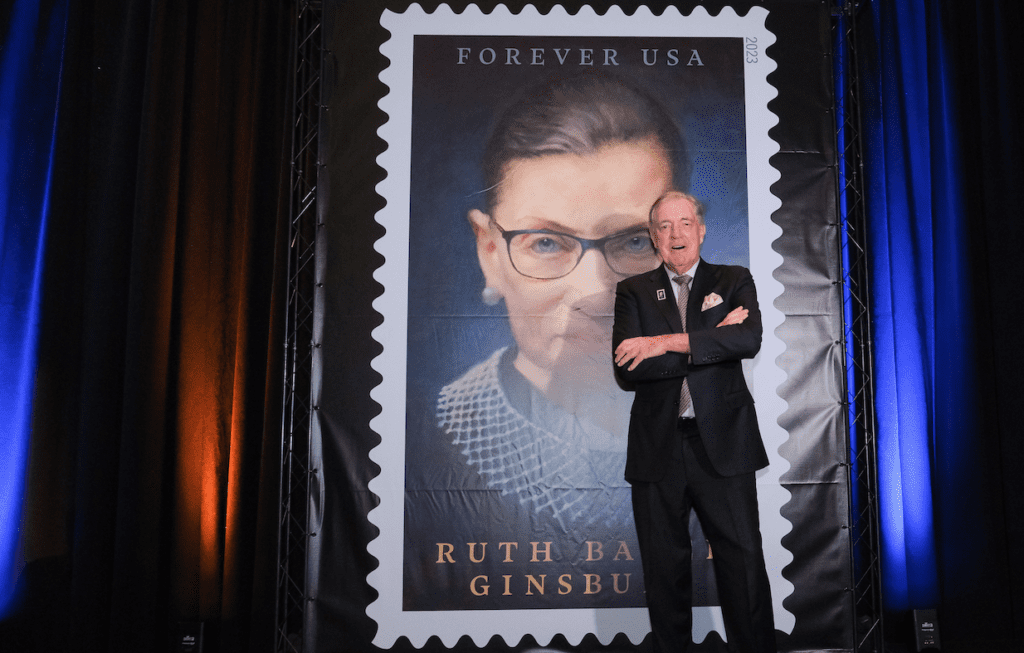Postal Service Launches Ruth Bader Ginsburg Stamp Inspired by Bermingham Photo
By • October 5, 2023 0 1599

When it comes to celebrating the “First Day of Issue” for a Forever Stamp dedicated to the legacy of the late U.S. Supreme Court Justice Ruth Bader Ginsburg (aka Notorious RBG, 1933-2020), the U.S. Postal Service delivered.
In the National Portrait Gallery’s Kogod Courtyard on Oct. 2, the USPS held an elaborate ceremony — punctuated by virtuoso operatic performances Ginsburg cherished — attended by hundreds, including Supreme Court Justices, past and present, members of Congress, legal luminaries and the Ginsburg family. Celebratory cake was served to all, Ginsburg stamps sold (for 66 cents each), and other framed RBG memorabilia made available.
Based on a photograph by renowned portrait photographer Philip Bermingham — whose works have graced many covers of The Georgetowner — designed by USPS art director Ethel Kessler, and painted by artist Michael Deas, the new Ginsburg Forever Stamp conveys a realist image of Ginsburg in her signature black judicial robe with beaded “dissent” collar. The stamp honors Ginsburg’s “groundbreaking contributions to justice, gender equality and the rule of law.”
Ginsburg was an “icon of American culture,” who gained a reputation as a respected voice for equal justice,” and “a lifelong trailblazer, not only as a woman in a male-dominated field but also as a law professor, an expert on anti-discrimination and equal protection law, and a judge who was unafraid to dissent from her colleagues in steadfast defense of her principles,” USPS said.
With opening remarks from Chief Justice John Roberts, tributes were given by a host of speakers including NPR’s Nina Totenberg, author of “Dinners with Ruth: A Memoir on the Power of Friendships,” Elizabeth Glazer, a former law clerk for Ginsburg, and Clara Spera, Harvard Law Lecturer and one of Ginsburg’s grandchildren.
The formal unveiling of the new stamp’s image was performed by Roman Martinez, chairman of the USPS Board of Governors.
“RBG changed the way the world is for American women, and she did that even before she became a judge,” Totenberg said. At that time, “women were treated by law differently from men… But, by the time [Ginsburg] became a judge in 1980, she had quite literally brought a revolution.”
“She was an unlikely pioneer, a diminutive woman whose soft voice belied a spine of steel,” Totenberg said. “And by the time she was in her late 80s she was, to her astonishment, and I have to say to her pleasure, something of a rock star to women and men of all ages. She was the subject of two movies, merchandise galore featuring her Notorious RBG moniker, a Time magazine cover, and regular Saturday Night Live sketches that invariably ended with Kate McKinnon, the Ginsburg imitator, declaring “And that’s the Ginsburn!”
In the 1960s and ’70s, recalled Glazer, “when Ginsburg was the founder of the ACLU’s Women’s Rights Project,” she worked “long into the night,” “fueled by coffee and cigarettes…” But the result was “six Supreme Court arguments in seven years that established fundamental rights for women and men. Thus, she paved her way to the nation’s highest court.
Lori Dym, who knew Ginsburg as a law clerk recalled attending the opera with Ginsburg in Washington and the lengthy standing ovations that would erupt when the audience recognized Ginsburg’s arrival. Ginsburg “would gently waver her arms to motion everyone to sit down, but it still took several minutes,” she said. “And people think Taylor Swift is a rock star…” Dym joked.
“What is the difference between a bookkeeper and a Supreme Court Justice?,” Ginsburg famously asked. “A generation.”

